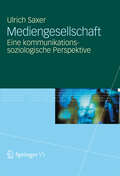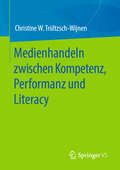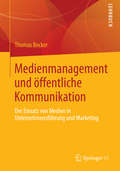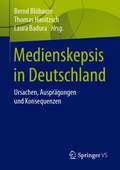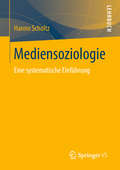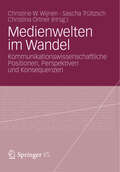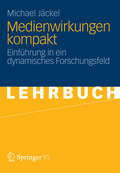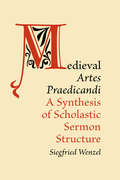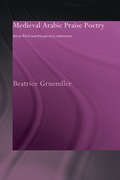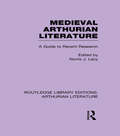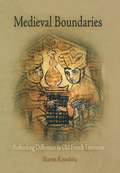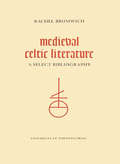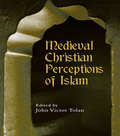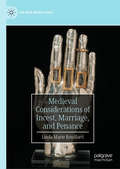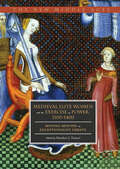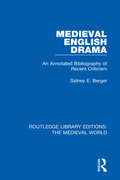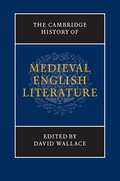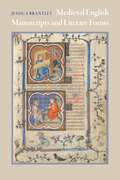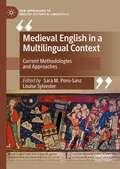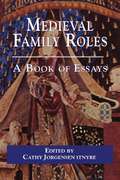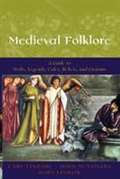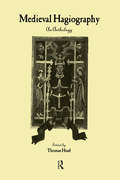- Table View
- List View
Medienhandeln zwischen Kompetenz, Performanz und Literacy
by Christine W. Trültzsch-WijnenDas Buch diskutiert die soziale und individuelle Bedingtheit von Medienkompetenz. Im Mittelpunkt steht die Frage, wie sich das Medienhandeln von Individuen im Hinblick auf deren Medienkompetenz, im Sinne eines sicheren und selbstbestimmten Handelns im Umgang mit Medien, erklären und beurteilen lässt. Dies setzt eine Betrachtung des Medienhandelns vor dem Hintergrund der Beziehungen zwischen der Kompetenz zu Handeln, als Summe von Fähigkeiten, Fertigkeiten und Wissen sowie der kognitiven Beherrschung von Regeln des Verhaltens (moralische Regeln, rechtliche Regeln sowie Regeln der Klugheit), und der Performanz, als tatsächliches Handeln eines Individuums, voraus. Dabei wird auf theoretischer Ebene der Frage nach der sozialen Determinierung eines selbstbestimmten Handelns im Umgang mit Medien einschließlich dafür erforderlicher Fähigkeiten, Fertigkeiten sowie des damit verbundenen Wissens nachgegangen. Außerdem wird das Verhältnis des deutschsprachigen Medienkompetenzdiskurses zum internationalen Diskurs über media literacy erläutert. Es werden Gemeinsamkeiten und Unterschiede herausgearbeitet und Potentiale für eine gegenseitige Befruchtung beider Perspektiven aufgezeigt. Darüber hinaus wird die empirische Relevanz und Anwendbarkeit dieser theoretischen Überlegungen anhand zweier Studien illustriert.
Medienmanagement und öffentliche Kommunikation: Der Einsatz von Medien in Unternehmensführung und Marketing
by Thomas BeckerWie setzt man Medien und Kommunikation ein, um unternehmerische Ziele zu erreichen? Das ist das Thema des Fachgebiets Medienmanagement. Im Medienmanagement unterscheidet man zwei Disziplinen: Medien und Kommunikation als Mittel der Unternehmensführung sowie Medien und Kommunikation als strategisches Instrument im Marketing. Beide Aspekte stellt das Lehrbuch Medienmanagement und öffentliche Kommunikation für Studium und Berufspraxis vor und dient damit als Kompass für die Anwendung erfolgreicher Unternehmenskommunikation.
Medienskepsis in Deutschland: Ursachen, Ausprägungen und Konsequenzen
by Bernd Blöbaum Thomas Hanitzsch Laura BaduraMedienskepsis ist in demokratischen Gesellschaften weit verbreitet. In allen gesellschaftlichen Gruppen finden sich Personen mit einer skeptischen Haltung gegenüber Medien. Das Buch zeichnet vorwiegend auf der Basis von qualitativen Interviews ein Profil von Medienskeptikern, beleuchtet ihre Motive, auslösende Faktoren sowie Konsequenzen der Skepsis. Ausgehend von einer wissenschaftlichen Einordnung von Medienskepsis werden ebenfalls Implikationen für die Medienpraxis herausgearbeitet.
Mediensoziologie: Eine systematische Einführung
by Hanno ScholtzWas haben Veränderungen in Gesellschaften und ihren Medien miteinander zu tun? Wo tragen Medien zu gesellschaftlichen Problemen bei und wo können sie diese lösen helfen? Wie wird darüber in der Wissenschaft diskutiert, und wie hängen diese Diskussionen zusammen? Ausgehend von Individuen mit ihren Wahrnehmungen und Handlungsentscheidungen, den von ihnen begründeten Institutionen, und einer knappen Definition von Medien bietet dieser Einführungsband in die Mediensoziologie eine systematische Darstellung, die einen Überblick ermöglicht und Probleme und im Fach geführte Diskussionen einordnen lässt.
Medienwelten im Wandel
by Christine W. Wijnen Sascha Trültzsch Christina OrtnerDie Autorinnen und Autoren dieses Bandes präsentieren zum einen kommunikationswissenschaftliche Positionierungen sowie theoretische Auseinandersetzungen mit medien- und kommunikationswissenschaftlichen Fragestellungen. Zum anderen zeigen sie die Perspektiven kommunikationswissenschaftlicher Forschung im Kontext von Interdisziplinarität und Internationalität auf oder leuchten die kommunikationswissenschaftliche Forschung aus der Perspektive anderer Disziplinen aus. Auch die bereits existierende und potentiell wechselseitige Bereicherung der, Disziplinen' wird hier diskutiert. Im abschließenden Teil werden die Relevanz von beziehungsweise die Schlussfolgerungen aus interdisziplinär und international angelegter kommunikationswissenschaftlicher Forschung für die Gesellschaft in den Mittelpunkt gestellt.
Medieval 'Artes Praedicandi'
by Siegfried WenzelBetween the early thirteenth and late fifteenth centuries, theologians and preachers in Western Europe adopted a distinct and rigidly structured sermon format. The scholastic sermon, as it was known, was taught through technical treatises known as artes praedicandi, of which approximately 230 survive.A dense and complicated arrangement, modern scholars often find the scholastic sermon challenging to understand and interpret. In this concise text, Siegfried Wenzel focuses on the main features of the sermon, from the initial thema to the concluding prayer. Medieval Artes Praedicandi also includes an annotated list of forty-two major surviving artes praedicandi, discussing the evolution of the genre, and a structural analysis of a sample sermon (from Worcester Cathedral Library Ms. F.10), which shows how the prescriptions of the artes were applied.Written by a leading expert on the late medieval scholastic sermon, Medieval Artes Praedicandi is an essential resource for scholars and advanced students interested in using scholastic sermons in their research.
Medieval Affect, Feeling, and Emotion (Cambridge Studies in Medieval Literature #107)
by Glenn D. Burger Holly A. CrockerRepresentations of feeling in medieval literature are varied and complex. This new collection of essays demonstrates that the history of emotions and affect theory are similarly insufficient for investigating the intersection of body and mind that late Middle English literatures evoke. While medieval studies has generated a rich scholarly literature on 'affective piety', this collection charts an intersectional new investigation of affects, feelings, and emotions in non-religious contexts. From Geoffrey Chaucer to Gavin Douglas, and from practices of witnessing to the adoration of objects, essays in this volume analyze the coexistence of emotion and affect in late medieval representations of feeling.
Medieval Arabic Praise Poetry: Ibn Al-Rumi and the Patron's Redemption (Routledge Studies in Middle Eastern Literatures #No. 2)
by Beatrice GruendlerThis book gives an insight into panegyrics, a genre central to understanding medieval Near Eastern Society. Poets in this multi-ethnic society would address the majority of their verse to rulers, generals, officials, and the urban upper classes, its tone ranging from celebration to reprimand and even to threat.
Medieval Arthurian Literature: A Guide to Recent Research (Routledge Library Editions: Arthurian Literature)
by Norris J. LacyThe focus of this book is medieval vernacular literature in Western Europe. Chapters are written by experts in the area and present the current scholarship at the time this book was originally published in 1996. Each chapter has a bibliography of important works in that area as well. This is a thorough and reliable guide to trends in research on medieval Arthuriana.
Medieval Boundaries
by Sharon KinoshitaIn Medieval Boundaries, Sharon Kinoshita examines the role of cross-cultural contact in twelfth- and early thirteenth-century French literature. Starting from the observation that many of the earliest and best-known works of the French literary tradition are set on or beyond the borders of the French-speaking world, she reads the Chanson de Roland, the lais of Marie de France, and a variety of other texts in an expanded geographical frame that includes the Iberian peninsula, the Welsh marches, and the eastern Mediterranean. In Kinoshita's reconceptualization of the geographical and cultural boundaries of the medieval West, such places become significant not only as sites of conflict but also as spaces of intense political, economic, and cultural negotiation.An important contribution to the emerging field of medieval postcolonialism, Kinoshita's work explores the limitations of reading the literature of the French Middle Ages as an inevitable link in the historical construction of modern discourses of Orientalism, colonialism, race, and Christian-Muslim conflict. Rather, drawing on recent historical and art historical scholarship, Kinoshita uncovers a vernacular culture at odds with official discourses of crusade and conquest. Situating each work in its specific context, she brings to light the lived experiences of the knights and nobles for whom this literature was first composed and--in a series of close readings informed by postcolonial and feminist theory--demonstrates that literary representations of cultural encounters often provided the pretext for questioning the most basic categories of medieval identity.Awarded honorable mention for the 2007 Modern Language Association Aldo and Jeanne Scaglione Prize for French and Francophone Studies
Medieval Celtic Literature: A Select Bibliography
by Rachel BromwichThe focus of this bibliography is the native literary tradition expressed in Irish and Welsh verse and prose from the earliest time to circa 1450. Priority is given to the most recent critical works and editions, provided that they supersede previous ones; however, earlier scholarly work and critical editions of texts that are now regarded as classics are also included. Because of the highly selective nature of this bibliography, Rachel Bromwich includes only a few studies on early legal texts, historical background, ecclesiastical learning, hagiography, archaeology and art, and folklore. The bibliography is divided into five chapters, of which two are intended for newcomers to the field and list the more available works of reference and aids to language study. The remaining three are devoted to literary history and criticism, texts and translations, and background material. The more than 500 entries have been arranged to show the ways in which the medieval literature of Ireland and Wales pursue parallel courses. In each chapter a general and comparative section is followed by sub-sections dealing with Irish material (including Cornish and Breton). Within each of these sub-sections individual items dealing with similar or closely related topics have been grouped together. Since this work is intended primarily for students working in English, the majority of the listings are in English, but important works in Irish, Welsh, French, and German are also cited.
Medieval Christian Perceptions of Islam: A Book of Essays
by John Victor TolanFor medieval Christians, Islam presented a series of disquieting challenges, and individual Christians portrayed Muslim culture in varied ways, according to their interests and prejudices. These fifteen original essays focus on unfamiliar texts that reflect the wide range of medieval Christianity's preoccupation with Islam, treating works from many different periods and in a wide range of genres and languages.
Medieval Considerations of Incest, Marriage, and Penance (The New Middle Ages)
by Linda Marie RouillardMedieval Considerations of Incest, Marriage, and Penance focuses on the incest motif as used in numerous medieval narratives. Explaining the weakness of great rulers, such as Charlemagne, or the fall of legendary heroes, such as Arthur, incest stories also reflect on changes to the sacramental regulations and practices related to marriage and penance. Such changes demonstrate the Church's increasing authority over the daily lives and relationships of the laity. Treated here are a wide variety of medieval texts, using as a central reference point Philippe de Rémi's thirteenth-century La Manekine, which presents one lay author's reflections on the role of consent in marriage, the nature of contrition and forgiveness, and even the meaning of relics. Studying a variety of genres including medieval romance, epic, miracles, and drama along with modern memoirs, films, and novels, Linda Rouillard emphasizes connections between medieval and modern social concerns. Rouillard concludes with a consideration of the legacy of the incest motif for the twenty-first century, including survivor narratives, and new incest anxieties associated with assisted reproductive technology.
Medieval Elite Women and the Exercise of Power, 1100–1400: Moving beyond the Exceptionalist Debate (The New Middle Ages)
by Heather J. TannerFor decades, medieval scholarship has been dominated by the paradigm that women who wielded power after c. 1100 were exceptions to the “rule” of female exclusion from governance and the public sphere. This collection makes a powerful case for a new paradigm. Building on the premise that elite women in positions of authority were expected, accepted, and routine, these essays traverse the cities and kingdoms of France, England, Germany, Portugal, and the Latin Kingdom of Jerusalem in order to illuminate women’s roles in medieval power structures. Without losing sight of the predominance of patriarchy and misogyny, contributors lay the groundwork for the acceptance of female public authority as normal in medieval society, fostering a new framework for understanding medieval elite women and power.
Medieval English Drama: An Annotated Bibliography of Recent Criticism (Routledge Library Editions: The Medieval World #4)
by Sidney E. BergerOriginally published in 1990, Medieval English Drama is an exhaustive bibliography of scholarship on medieval English drama. Each item has been annotated in the bibliography with considerable care; these annotations are descriptive rather than critical and give a clear synopsis of the content of each reference, the texts with which it deals, and a brief indication of its critical position. The bibliography is divided into two sections; editions and collections of plays, and critical works. The bibliography is exhaustive rather than selective and provides English annotations for foreign language works, as well as a list of reviews for most books. The book covers liturgical and folk drama, other forms of entertainment, and related material useful to researchers in the field. The book provides an update of sources not listed in Carl J. Stratman's comprehensive Bibliography of Medieval Drama published in 1972.
Medieval English Literature (The New Cambridge History Of English Literature)
by Seth Lerer Christopher Baswell David Wallace Susan Crane Thomas Hahn Lesley Johnson Jocelyn Wogan-Browne Rosalind Field Brynley F. RobertsThis is the first full-scale history of medieval English literature in nearly a century. Thirty-three contributors provide information on a vast range of literary texts and the conditions of their production and reception. The volume also contains a chronology, full bibliography and a detailed index. This book offers the most extensive account available of the medieval literatures so drastically reconfigured in Tudor England. It will prove essential reading for scholars of the Renaissance as well as medievalists, and for historians as well as literary specialists.
Medieval English Manuscripts and Literary Forms (Material Texts)
by Jessica BrantleyIn Medieval English Manuscripts and Literary Forms, Jessica Brantley offers an innovative introduction to manuscript culture that uses the artifacts themselves to open some of the most vital theoretical questions in medieval literary studies. With nearly 200 illustrations, many of them in color, the book offers both a broad survey of the physical forms and cultural histories of manuscripts and a dozen case studies of particularly significant literary witnesses, including the Beowulf manuscript, the St. Albans Psalter, the Ellesmere manuscript of the Canterbury Tales, and The Book of Margery Kempe. Practical discussions of parchment, scripts, decoration, illustration, and bindings mix with consideration of such conceptual categories as ownership, authorship, language, miscellaneity, geography, writing, editing, mediation, illustration, and performance—as well as of the status of the literary itself.Each case study includes an essay orienting the reader to particularly productive categories of analysis and a selected bibliography for further research. Because a high-quality digital surrogate exists for each of the selected manuscripts, fully and freely available online, readers can gain access to the artifacts in their entirety, enabling further individual exploration and facilitating the book’s classroom use. Medieval English Manuscripts and Literary Forms aims to inspire a broad group of readers with some of the excitement of literary manuscript studies in the twenty-first century. The interpretative frameworks surrounding each object will assist everyone in thinking through the implications of manuscript culture more generally, not only for the deeper study of the literature of the Middle Ages, but also for a better understanding of book cultures of any era, including our own.
Medieval English in a Multilingual Context: Current Methodologies and Approaches (New Approaches to English Historical Linguistics)
by Sara M. Pons-Sanz Louise SylvesterThis edited book examines the multilingual culture of medieval England, exploring its impact on the development of English and its textual manifestations from a multi-disciplinary perspective. The book offers overviews of the state of the art of research and case studies on this subject in (sub)disciplines of linguistics including historical linguistics, onomastics, lexicology and lexicography, sociolinguistics, code-switching and language contact, and also includes contributions from literary and socio-cultural studies, material culture, and palaeography. The authors focus on the variety of languages in use in medieval Britain, including English, Old Norse, Norn, Dutch, Welsh, French, and Latin, making the argument that understanding the impact of medieval multilingualism on the development of English requires multidisiplinarity and the bringing together of different frameworks in linguistics and cultural studies to achieve more nuanced answers. This book will be of interest to academics and students of historical linguistics and medieval textual culture.
Medieval Family Roles: A Book of Essays (Garland Medieval Casebooks #Vol. 15)
by Cathy Jorgensen ItnyreThis colelction of twelve original essays by European and American scholars, offers some of the latest research in three broad areas of medieval history: marriage, children, and family ties.
Medieval Folklore: A Guide to Myths, Legends, Tales, Beliefs, and Customs
by Carl Lindahl; John McNamara; John LindowOver a decade in the making, Medieval Folklore offers a wide-ranging guide to the lore of the Middle Ages--from the mundane to the supernatural. Definitive and lively articles focus on the great tales and traditions of the age and includes information on daily and nightly customs and activities; religious beliefs of the pagan, Christian, Muslim, and Jew; key works of oral and written literature; traditional music and art; holidays and feasts; food and drink; and plants and animals, both real and fantastical. <p><p> While most books on medieval folklore focus primarily on the West, this unique volume brings together an eclectic range of experts to treat the subject from a global perspective. Especially remarkable are the surveys of the major medieval traditions including Arab-Islamic, Baltic, English, Finno-Ugric, French, Hispanic, Hungarian, Irish, Italian, Jewish, Scandinavian, Scottish, Slavic, and Welsh. <p> For anyone who has ever wanted a path through the tangle of Arthurian legends, or the real lowdown on St. Patrick, or the last word on wolf lore--this is the place to look.
Medieval German Literature: A Companion (Garland Medieval Bibliographies Ser.)
by Marion Gibbs Sidney M. JohnsonMedieval German Literature provides a comprehensive survey of this Germanic body of work from the eighth century through the early fifteenth century. The authors treat the large body of late-medieval lyric poetry in detail for the first time.
Medieval Hagiography: An Anthology (Garland Library of Medieval Literature #14)
by Thomas HeadFirst published in 2000. Routledge is an imprint of Taylor & Francis, an informa company.
Medieval Herbal Remedies: The Old English Herbarium and Anglo-Saxon Medicine
by Anne Van ArsdallThis book presents for the first time an up-to-date and easy-to-read translation of a medical reference work that was used in Western Europe from the fifth century well into the Renaissance. Listing 185 medicinal plants, the uses for each, and remedies that were compounded using them, the translation will fascinate medievalist, medical historians and the layman alike.
